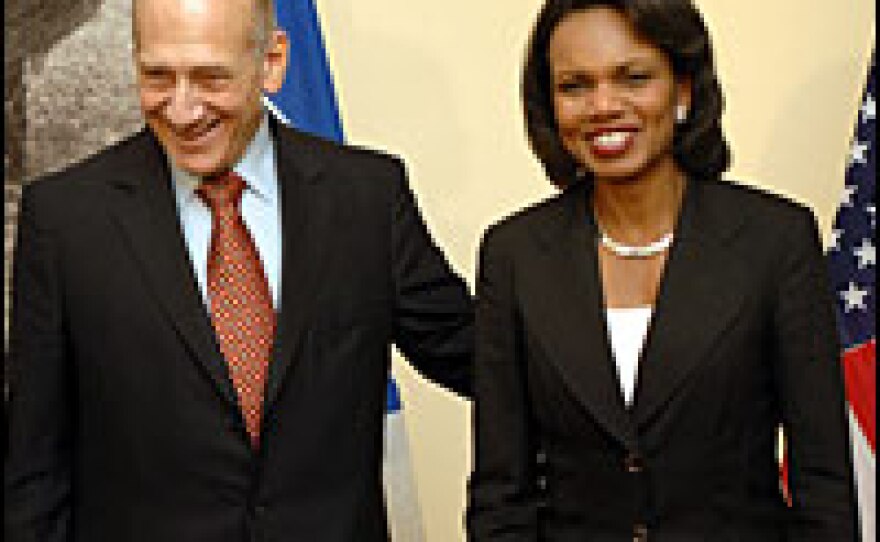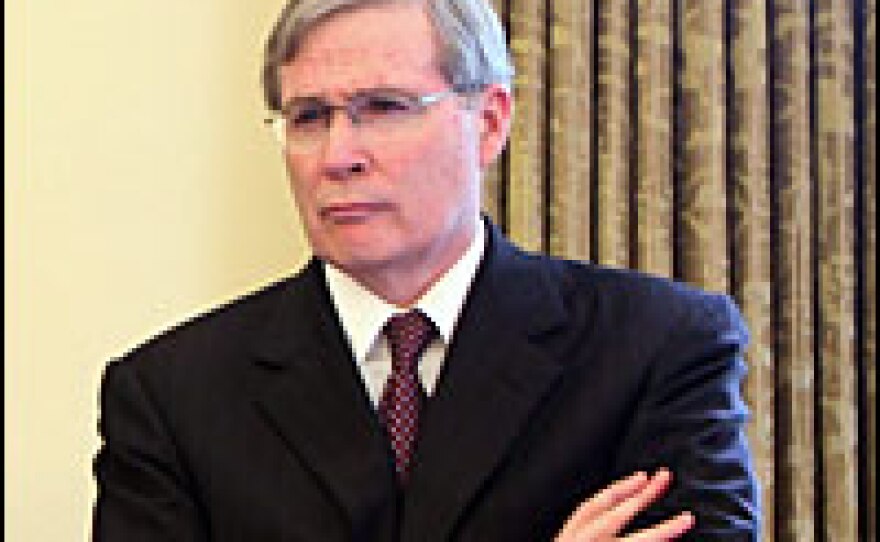
President Bush will send his national security adviser to the Middle East next week just days after Secretary of State Condoleezza Rice's return, as the U.S. steps up pressure on the Israelis and Palestinians to begin peace talks.
National security adviser Stephen Hadley and Rice are trying to bridge wide gaps between the two sides in a document outlining how they intend to resume talks that will be presented at a U.S.-hosted conference this fall, a senior official said.
Rice, who has made seven trips there this year, is scheduled to return to the Middle East in late October or in early November, shortly after Hadley's visit.
Meetings Encouraging
Rice said she was encouraged by four days of intense meetings with Israeli and Palestinian officials and civic and business leaders in Jerusalem, and Ramallah and Bethlehem in the West Bank.
But she also acknowledged splits between the two sides as they try to craft a joint statement that is to be endorsed at a U.S.-sponsored conference in late November or December. U.S. officials are hoping the conference in Annapolis, Md., will jump start negotiations to create a Palestinian state.
"I think they are very serious," Rice told reporters Thursday as she flew to London. "The teams are serious. The people are serious. The issues are serious.
"So, I am not surprised that there are tensions. I am not surprised that there are some ups and downs," she said. "That is the character of this kind of endeavor, but I was encouraged by what I heard."
Hadley's trip, so close on the heels of Rice's visit this week, is intended not only to move the two sides closer, but to underscore the U.S. commitment to the creation of a Palestinian state, the official said.
When Rice returns, she will also meet with Iraq's neighbors in Istanbul, Turkey, said the official, who spoke on condition of anonymity because neither the Hadley trip nor Rice's return visit have been formally announced.
The flurry of diplomatic activity aims to push Israelis and the Palestinians into consensus on the substance of the conference's joint declaration, which would outline a way for the two sides to return to the negotiating table after seven years of bloodshed and diplomatic paralysis.
Egypt Backs Talks
The Palestinians and their Arab allies, including Egypt and Jordan, are insisting the document be detailed and set a timetable for formal peace talks. The Israelis want language that is more vague.
Rice, who won public backing for the conference from Egypt during a Tuesday stop in Cairo, was in London on Thursday to lobby for backing from Jordan's King Abdullah II.
Rice had downplayed the chances for any breakthroughs this week, but she appeared pleased with the results of the mission even though she continued to caution that difficult work is still ahead.
Many of her discussions focused on the security and economic issues that will present themselves once a Palestinian state is created next to Israel.
"I am quite convinced that one of the really crucial pieces that has to be filled in are these concepts of how the states will relate to each other in practical terms concerning security and in practical terms concerning economic issues," she said.
Rice also stressed that the joint statement will only be a starting point for formal peace talks and will not be intended to resolve those issues.
"All this document is trying to do is to demonstrate that they now believe they have a basis for pushing forward on the resolution of those outstanding issues," Rice said.
The Palestinians want the document to include at least a sentence or two on how to solve each of the major issues of dispute, such as borders and Jerusalem, which both sides want to claim as their capital.
The Palestinians' core demand is that the future border between Israel and Palestine be based on the pre-1967 Mideast War lines, with modifications through land swaps. Israel captured the West Bank and other areas in the 1967 war.
But Israel has balked at such specificity and the Palestinian president Mahmoud Abbas angrily complained when Rice tried to get him to back down, according to a senior Palestinian official.
Israel is "hindering the endeavor to reach a document with substance," Abbas said. His comments drew a rebuke from Israeli Foreign Minister Tzipi Livni who said she would not stoop to play "the blame game."
From NPR reports and The Associated Press
Copyright 2022 NPR. To see more, visit https://www.npr.org. 9(MDAzMjM2NDYzMDEyMzc1Njk5NjAxNzY3OQ001))






